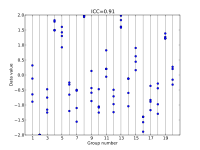
Coordination tracking of multi‐agent dynamical systems with general linear node dynamics
Sign Up to like & getrecommendations! Published in 2017 at "International Journal of Robust and Nonlinear Control"
DOI: 10.1002/rnc.3753
Abstract: Summary Distributed coordinated tracking problems are investigated in this paper for a class of multi-agent dynamical systems with general linear node dynamics under a directed fixing interaction topology. First, a kind of class of distributed… read more here.
Keywords: node dynamics; linear node; multi agent; general linear ... See more keywords

Cooperative tracking control for general linear multiagent systems with directed intermittent communications: An artificial delay approach
Sign Up to like & getrecommendations! Published in 2019 at "International Journal of Robust and Nonlinear Control"
DOI: 10.1002/rnc.4540
Abstract: This paper investigates the consensus tracking problem for general linear multiagent systems on directed graph containing a spanning tree. For the considered linear systems, the consensus tracking aim cannot be achieved by using only memoryless… read more here.
Keywords: general linear; multiagent systems; linear multiagent; systems directed ... See more keywords

The hyperstability of general linear equation via that of Cauchy equation
Sign Up to like & getrecommendations! Published in 2018 at "Aequationes mathematicae"
DOI: 10.1007/s00010-018-0619-7
Abstract: In this paper, we show that the hyperstability of the general linear equation recently proved by Piszczek (Aequationes Math 88:163–168, 2014) is a direct consequence of that of the Cauchy equation proved earlier by Brzdȩk… read more here.
Keywords: linear equation; hyperstability general; cauchy equation; general linear ... See more keywords

On the variance parameter estimator in general linear models
Sign Up to like & getrecommendations! Published in 2019 at "Metrika"
DOI: 10.1007/s00184-019-00751-4
Abstract: In the present note we consider general linear models where the covariates may be both random and non-random, and where the only restrictions on the error terms are that they are independent and have finite… read more here.
Keywords: parameter estimator; estimator; variance parameter; general linear ... See more keywords

On the number of derangements and derangements of prime power order of the affine general linear groups
Sign Up to like & getrecommendations! Published in 2017 at "Journal of Algebraic Combinatorics"
DOI: 10.1007/s10801-016-0709-3
Abstract: A derangement is a permutation that has no fixed points. In this paper, we are interested in the proportion of derangements of the finite affine general linear groups. We prove a remarkably simple and explicit… read more here.
Keywords: derangements prime; linear groups; power order; general linear ... See more keywords

Interval Estimation of the Intra-class Correlation in General Linear Mixed Effects Models
Sign Up to like & getrecommendations! Published in 2021 at "Journal of statistical theory and practice"
DOI: 10.1007/s42519-021-00202-2
Abstract: The computation of confidence intervals for the intra-class correlation coefficient is addressed under general linear mixed effects models. Higher order asymptotic procedures are applied to derive accurate confidence intervals and are compared with a confidence… read more here.
Keywords: effects models; intra class; linear mixed; mixed effects ... See more keywords

Robust Regulator Design of General Linear Systems with Sampled Measurements
Sign Up to like & getrecommendations! Published in 2020 at "IFAC-PapersOnLine"
DOI: 10.1016/j.ifacol.2020.12.1662
Abstract: Abstract This paper studies the robust output regulation problem of general linear continuous-time systems with periodically sampled measurements, consisting of both the regulation errors and the extra measurements. With some standard conditions, we propose a… read more here.
Keywords: general linear; time; sampled measurements; regulator design ... See more keywords

On the maximal L-L regularity of solutions to a general linear parabolic system
Sign Up to like & getrecommendations! Published in 2020 at "Journal of Differential Equations"
DOI: 10.1016/j.jde.2019.09.058
Abstract: We show the existence of solution in the maximal $L_p-L_q$ regularity framework to a class of symmetric parabolic problems on a uniformly $C^2$ domain in ${\mathcal R}$. Our approach consist in showing ${\mathcal R}$ -… read more here.
Keywords: maximal regularity; linear parabolic; regularity; general linear ... See more keywords

On equivalence of predictors/estimators under a multivariate general linear model with augmentation
Sign Up to like & getrecommendations! Published in 2017 at "Journal of The Korean Statistical Society"
DOI: 10.1016/j.jkss.2017.04.001
Abstract: Assume that a true multivariate general linear model for an observed random matrix is over-parameterized by adding some new regressors due to model uncertainty. Then predictors and estimators of parameter spaces in the true and… read more here.
Keywords: linear model; general linear; multivariate general; predictors estimators ... See more keywords

The essential 2-rank of general linear and unitary groups
Sign Up to like & getrecommendations! Published in 2021 at "Journal of Pure and Applied Algebra"
DOI: 10.1016/j.jpaa.2020.106518
Abstract: Abstract Let G be a general linear or unitary group over a finite field of odd characteristic and let D ≤ G be a Sylow 2-subgroup. In this paper, we classify essential subgroups of the… read more here.
Keywords: essential rank; unitary groups; general linear; linear unitary ... See more keywords

Observer-based event-triggered control for consensus of general linear MASs
Sign Up to like & getrecommendations! Published in 2017 at "Iet Control Theory and Applications"
DOI: 10.1049/iet-cta.2017.0510
Abstract: This study investigates the consensus problem for general linear multi-agent systems (MAS) via observer-based dynamic output feedback event-triggered control. Assume that the relative state information is unknown for each agent and only the relative output… read more here.
Keywords: control; consensus; observer based; general linear ... See more keywords